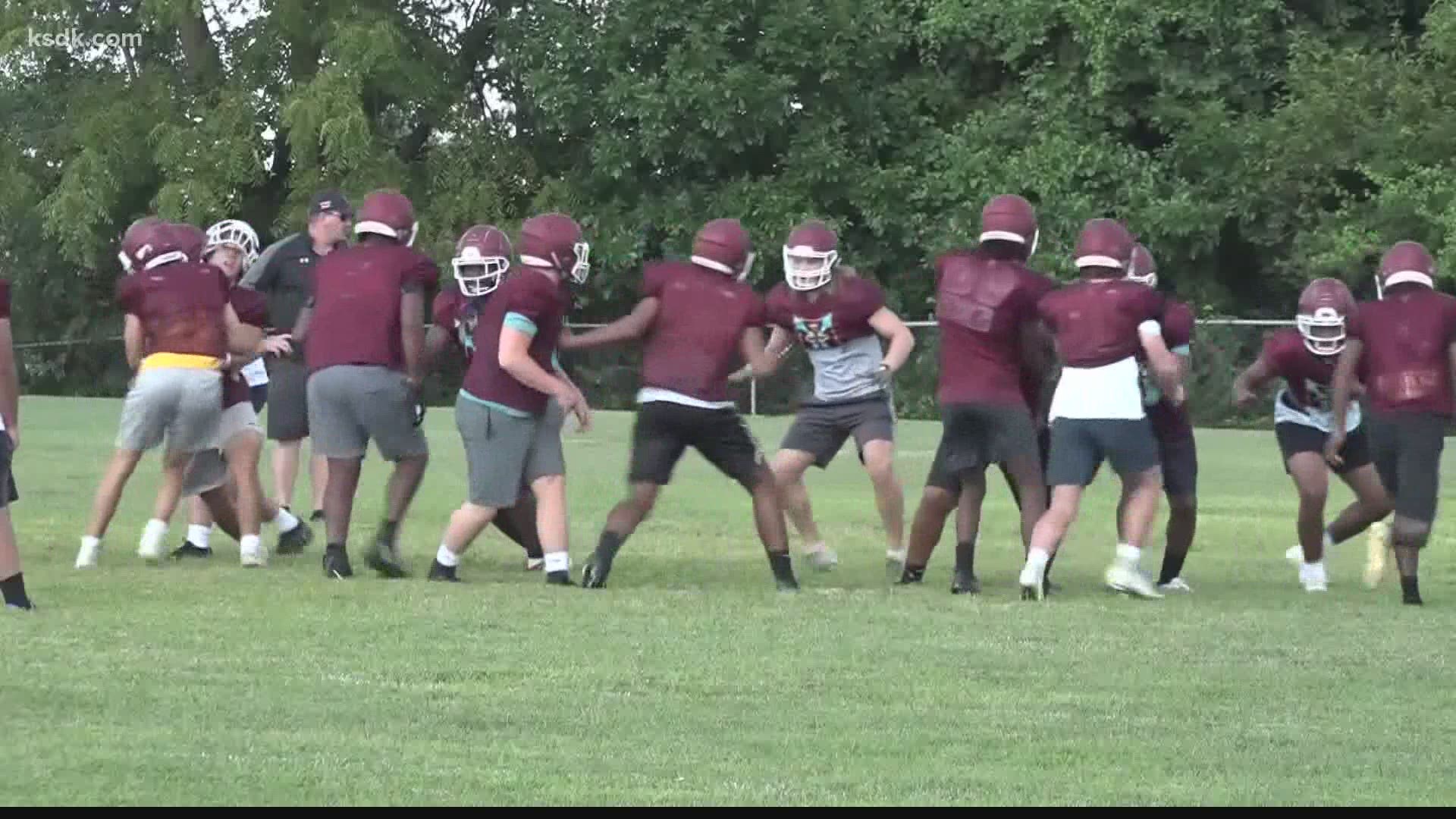ST. LOUIS COUNTY, Mo. — The St. Louis County Department of Public Health issued specific guidelines Friday for youth sports due to a rise in the number of positive COVID-19 cases among young people.
Teams will only be allowed to practice and play within-team competitions, but not compete against other teams or practice in any tournaments.
The health department said the risk of spreading COVID-19 in youth sports is at its lowest during skill-building drills or conditioning at home, alone or with family members and at its highest during full competition between teams from different areas.
The following guidelines go into effect Monday, July 20.
Permitted activities
All youth sports are limited to skills development and practices, and are permitted if:
- Social distancing of at least 6 feet shall be maintained.
- Limited number of individuals, including coaches, in a single space, allowing social distancing of at least 6 feet.
- No more than 10 individuals, including coaches, are in that single space
- The space should be separated by a barrier or large enough distance that individuals can maintain social distancing and no players or coaches should be within 6 feet of each other
- There should be no interaction between groups of 10
- All workout machines and equipment must be wiped down with disinfectant after each use
- Athletes should not interact with anyone outside the area where their individual workout is located
- Effective July 20, no games, scrimmages, showcases, tournaments or any other competitive play is allowed
Requirements
- Athletes, coaches, officials, referees, and umpires have to do a health screening and temperature check prior to starting any sports activity
- Spectators will be not be allowed during permitted activities
- Players must wear a face covering when not actively involved in strenuous physical activity, including practice or training
- Coaches, officials, referees and umpires must wear a face covering at all times
- Screening times and practice start times must be spaced out to limit the number of athletes and others in the area.
- No competitive play within local sports leagues will be allowed.
- Limit the number of players sitting in confined areas (e.g., dugouts) to allow for social distancing.
- Hand hygiene is essential. Organizations and facilities shall promote frequent and effective hand hygiene by supplying ample hand sanitizer dispensers and hand-washing stations.
- The use of locker rooms is not recommended. If they must be used, proper social distancing must apply within the locker room. Proper area for equipment storage and cleaning is required.
- Limit the number of people present to necessary individuals at practices. To the extent people are present, their identity and contact information should be known for contact tracing purposes.
- Parents, guardians, and others that would be spectators shall remain in a separate area away from the athletes and not be allowed onto the field or other areas where the athletes practice or gather.
- No congregating shall be allowed by parents, guardians and would be spectators at the fields or outside of their individual modes of transportation.
- A drop-off and pick-up line for practices is recommended to avoid unnecessary exposure.
- Do not share water bottles. An individual athlete may use their own water bottle, which should be clearly marked with their name. Cups used for water should be single-use and disposable.
- Coolers must be properly sanitized after each use, and each team or group shall have its own cooler.
- Follow CDC guidance for cleaning and disinfecting coolers.
- Avoid whirlpools or cold/hot tubs. If they are required in an emergency, follow best practices. Have a cold-water immersion tub on-site or within 5 minutes of the field.
- If you have ice towels available, follow CDC guidance for cleaning and disinfecting. Ice towels shall be used only once, then discarded or washed properly.
- Do not allow team huddles, handshakes, fist bumps, or other unnecessary physical contact. Remember, social distancing of at least 6 feet shall be maintained at all times.
- Any shared equipment must be disinfected with EPA certified products. Equipment should be disinfected, if possible, after each use, or after each inning or play period.
- Any jerseys used during these workouts must be washed daily and not shared among players.
Screening
Every coach and athlete must be screened when they enter the facility where the activity will occur and should wear a face mask for the duration of the screening if possible.
One person should be designated to provide screenings and that person must wear a face mask and gloves when screening others.
Ask each person if they have experienced the following symptoms in the past 24 hours:
- Fever (temperature greater than 100.4 degrees)
- New or worsening cough
- Shortness of breath or trouble breathing
- Sore throat, different than your seasonal allergies
- New loss of smell and/or taste
- Diarrhea or vomiting
Ask if they have had close contact with someone who has been diagnosed with COVID-19 in the past 2 weeks.
If an athlete, coach or official tests positive for the virus, they should be sent home immediately. If the athlete’s parents aren’t present, the athlete should be escorted to a designated isolation room or an area away from others. They should also wear a face covering.
Individuals who have had significant exposure to someone with the virus, that individual must quarantine for 14 days. If the exposed individual has a negative test result, they must still quarantine.
Special considerations for those with health conditions
Athletes, coaches and parents are encouraged to consider delaying the players participation in sports and activities if the player or coach have any of the following conditions:
- Chronic lung disease, including moderate or severe asthma;
- Type 2 diabetes;
- Chronic kidney disease;
- Sickle Cell disease;
- Heart conditions; or
- Immunocompromised (e.g. any transplant recipient needing immunosuppressant medications– steroids, biologics, etc., and patients receiving chemotherapy) – if you think your child is immunocompromised, please check with your child’s healthcare provider.
Click here for a closer look at the new guidelines.
Related Stories
- Parkway Schools releases learning plans for upcoming school year
- Mask mandate in Missouri? Here's what Gov. Parson has to say
- St. Louis County executive gives update on CARES Act funding for humanitarian causes
- New COVID-19 restrictions on youth sports in St. Louis County have some parents, players and coaches divided
- St. Louis County executive encourages school districts to offer virtual classes, but says he knows it's not ideal
- Here are the guidelines Missouri schools should follow this fall


